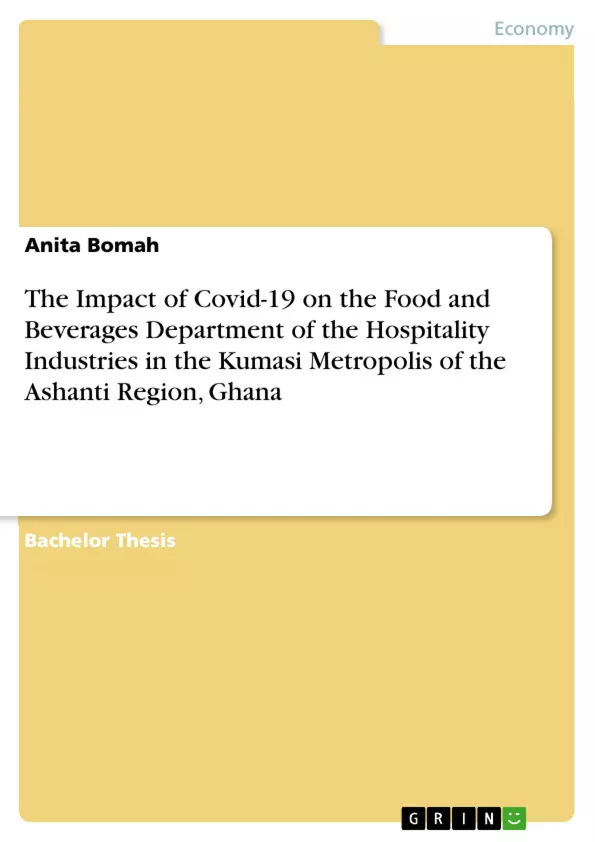The purpose of this study was to obtain evidence of the effects of the Covid-19 pandemic on the food and beverages department of some hospitality industries in the Kumasi metropolis. A descriptive cross-sectional survey was adopted where the researcher collected data at one point in time from employees of the food and beverages departments of 10 hospitality industries in the Kumasi metropolis using simple random sampling. Questionnaire and interview guide were the main research instruments used to gather data for the study. SPSS was used to analyse the data gathered. The data was edited, coded, presented and analysed using statistical tools such as frequency, percentages, mean and standard deviation. It was revealed through the study that the Covd-19 pandemic has resulted in an increase in the cost of production and reduction in the daily revenue generated. The has been a reduction in the average daily seating capacity in the food and beverages department as a result of the pandemic. The rippling effect of the pandemic has also led to the laying off of some staff whiles others had to quit due to low production and patronage. Employment of new staffs has also been on the low during the pandemic.
Based on the findings, it was recommended that, managers of food and beverages department of hospitality industries should maximise opportunities for home delivery services for customers. Customers should be encouraged to patronise the take away services and also take advantage of the home delivery services offered by management.
Inhaltsverzeichnis (Table of Contents)
- Dedication
- Acknowledgement
- Table of Contents
- Abstract
- CHAPTER ONE
- INTRODUCTION
- 1.0 Background to the Study
- 1.1 Statement of the Problem
- 1.2 Purpose of the Study
- 1.3 Research Questions
- 1.4 Significance of the Study
- 1.5 Delimitations
- 1.6 Limitations
- 1.7 Organization of the Rest of the Study
- CHAPTER TWO
- LITERATURE REVIEW
- 2.1 Operations of the Food and Beverages Department of the Hospitality Industry
- 2.2 Customer Service and Participation in the Food and Beverages Department
- 2.3 Staff Organization and Performance in the Food and Beverages Department
- CHAPTER THREE
- RESEARCH METHODOLOGY
- 3.0 Research Design
- 3.1 Population of the Study
- 3.2 Sample and Sampling Procedure
- 3.3 Data Collection Instruments
- 3.4 Validity and Reliability of the Research Instruments
- 3.5 Data Collection Procedure
- 3.6 Data Analysis
- CHAPTER FOUR
- PRESENTATION AND DISCUSSION OF RESULTS
- 4.0 Overview
- 4.1 Demography of Respondents
Zielsetzung und Themenschwerpunkte (Objectives and Key Themes)
This research aims to investigate the impact of the COVID-19 pandemic on the food and beverages department of the hospitality industry in Kumasi Metropolis, Ashanti Region, Ghana. The study explores the challenges faced by these businesses and the strategies employed to overcome them.
- Impact of COVID-19 on Food and Beverage Operations
- Customer Service and Participation in the Food and Beverage Industry during the Pandemic
- Staff Organization and Performance in Food and Beverage Establishments amidst COVID-19
- Strategies Implemented by Hospitality Businesses to Adapt to Pandemic Conditions
- The Future of Food and Beverage Services in the Post-COVID-19 Era
Zusammenfassung der Kapitel (Chapter Summaries)
Chapter one introduces the study, outlining the background, problem statement, purpose, research questions, significance, delimitations, limitations, and organization of the research. Chapter two provides a comprehensive review of relevant literature on the operations of the food and beverage department, customer service, and staff organization and performance within the hospitality industry. This review explores the impact of COVID-19 on these aspects and highlights existing knowledge and theories related to the study. Chapter three delves into the methodology employed, outlining the research design, population, sample, data collection instruments, validity and reliability, data collection procedure, and data analysis methods.
Schlüsselwörter (Keywords)
This research focuses on the hospitality industry, food and beverage operations, COVID-19 impact, customer service, staff organization, performance, adaptation strategies, and the post-pandemic future of food and beverage services.
- Citation du texte
- Anita Bomah (Auteur), 2021, The Impact of Covid-19 on the Food and Beverages Department of the Hospitality Industries in the Kumasi Metropolis of the Ashanti Region, Ghana, Munich, GRIN Verlag, https://www.grin.com/document/1165278



